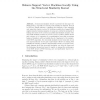Free Online Productivity Tools
i2Speak
i2Symbol
i2OCR
iTex2Img
iWeb2Print
iWeb2Shot
i2Type
iPdf2Split
iPdf2Merge
i2Bopomofo
i2Arabic
i2Style
i2Image
i2PDF
iLatex2Rtf
Sci2ools
113
click to vote
PAKDD
2011
ACM
2011
ACM
Balance Support Vector Machines Locally Using the Structural Similarity Kernel
A structural similarity kernel is presented in this paper for SVM learning, especially for learning with imbalanced datasets. Kernels in SVM are usually pairwise, comparing the similarity of two examples only using their feature vectors. By building a neighborhood graph (kNN graph) using the training examples, we propose to utilize the similarity of linking structures of two nodes as an additional similarity measure. The structural similarity measure is proven to form a positive definite kernel and is shown to be equivalent to a regularization term that encourages balanced weights in all local neighborhoods. Analogous to the unsupervised HITS algorithm, the structural similarity kernel turns hub scores into signed authority scores, and is particularly effective in dealing with imbalanced learning problems. Experimental results on several benchmark datasets show that structural similarity can help the linear and the histogram intersection kernel to match or surpass the performance of ...
Related Content
| Added | 16 Sep 2011 |
| Updated | 16 Sep 2011 |
| Type | Journal |
| Year | 2011 |
| Where | PAKDD |
| Authors | Jianxin Wu |
Comments (0)

